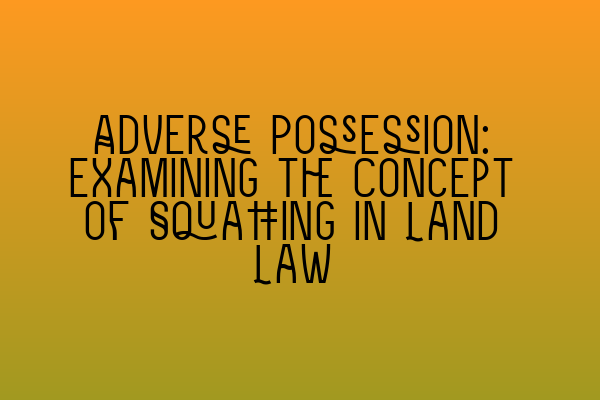Adverse Possession: Examining the Concept of Squatting in Land Law
Welcome to the SQE Property Law & Land Law blog! In this article, we will delve into the intriguing concept of adverse possession and explore the legalities surrounding squatting in land law. Whether you are a property owner, a squatter, or simply interested in the intricacies of property law, this article will provide you with a comprehensive understanding of adverse possession and its implications.
What is Adverse Possession?
Adverse possession is a legal principle that allows a person to acquire legal ownership of land owned by someone else, without the need for a purchase or transfer of title. This is achieved through the occupation of the land in an open, notorious, and exclusive manner for a specified period of time.
The concept of adverse possession can often be misunderstood, and the term “squatter” used interchangeably. However, it is important to note that adverse possession is a legal doctrine, while squatting refers to the act of occupying a property without lawful authority.
Now, let’s explore some key elements in the concept of adverse possession.
1. Continuous Possession
In order to assert a claim of adverse possession, the occupier must demonstrate continuous and uninterrupted possession of the land for a specific period of time. This period varies depending on the jurisdiction, but in the UK, it is generally 10 or 12 years.
2. Open and Notorious
The possession must be open and notorious, meaning that it is obvious to anyone who observes the property that someone else is occupying it without permission. This requirement aims to ensure that the true owner has a reasonable opportunity to discover the adverse possession.
3. Exclusive Possession
The adverse possessor must hold exclusive possession of the land, meaning that they have sole control and use of the property to the exclusion of others, including the legal owner. This requirement distinguishes adverse possession from situations where multiple individuals may have rights to access or use the land.
The Implications of Adverse Possession
Now that we have a clearer understanding of adverse possession, it is essential to consider its implications in the context of property ownership and land law.
Firstly, adverse possession can result in a legal transfer of ownership. If all the elements of adverse possession are met, the squatter may effectively become the rightful owner of the property, even if they initially had no legal entitlement to it. This can have significant consequences for the true owner, who may find themselves dispossessed of their land.
Secondly, adverse possession can create challenges in property transactions. Parties seeking to buy or sell land must be aware of any potential claims of adverse possession, as they can affect the title and value of the property. Therefore, it is crucial to conduct thorough due diligence and seek legal advice to mitigate the risks associated with adverse possession.
Related Articles:
- Updates in UK Property Laws: Key Changes and Implications
- Legal challenges in property transactions: A comprehensive guide
- Navigating Lease Laws in the UK: Essential Guidelines for Tenants and Landlords
- Dominate Property Law Questions: Avoiding Common Pitfalls
- Land Law Revision Tips: Ace Your Exam Preparation
It is important to stay informed about updates and changes in UK property laws, as they can impact your property rights and legal obligations. Understanding potential legal challenges in property transactions can help you navigate complex negotiations and protect your interests. Additionally, knowing the guidelines for lease laws is essential for both tenants and landlords to avoid potential conflicts and disputes.
Lastly, if you are studying property law, our article on how to dominate property law questions and avoid common pitfalls and our land law revision tips can provide valuable insights to help you excel in your exam preparation.
In conclusion, adverse possession is a fascinating and complex area of land law that has significant implications for property owners, squatters, and anyone interested in property law. By understanding the elements of adverse possession and staying informed about related legal issues, you can navigate the intricacies of property law and protect your rights in the dynamic world of real estate.
Thank you for reading our blog post! We hope you found this article informative and engaging.
